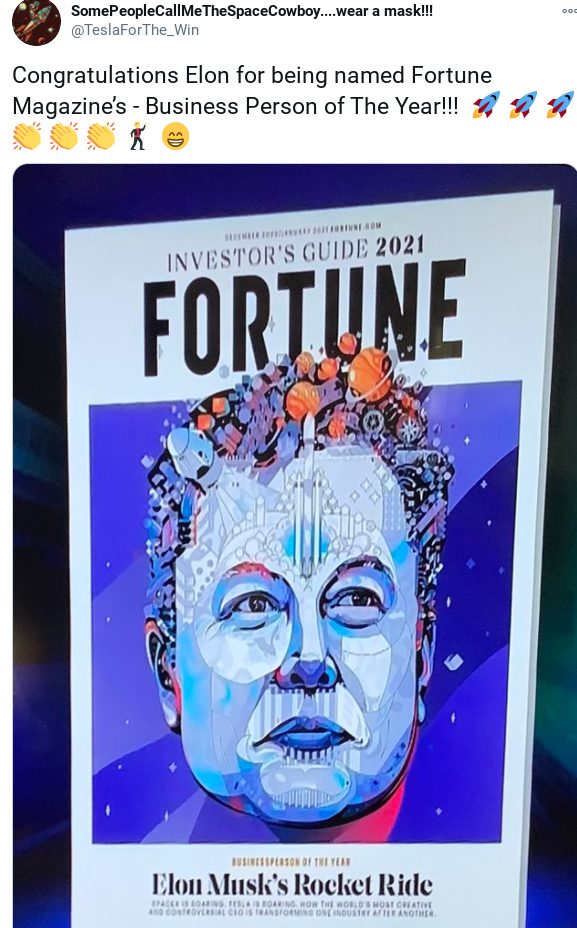December 2nd, 2020 by Johnna Crider

Fortune Magazine has named Elon Musk as its Businessperson of the Year for 2020. Fortune pointed out that Elon Musk has “seemingly defied gravity this year” with his success at Tesla, which is now one of the world’s most valuable companies. SpaceX wasn’t left out either. The article noted that Elon was able to send humans into orbit from the US for the first time since NASA stopped doing so back in 2011. What’s his secret? The article pointed out that the key to Elon’s success is his resilience.
Congratulations Elon for being named Fortune Magazine’s – Business Person of The Year!!! 🚀 🚀 🚀 👏 👏 👏 🕺 😁 pic.twitter.com/cl1r5CfvZt
— SomePeopleCallMeTheSpaceCowboy….wear a mask!!! (@TeslaForThe_Win) December 2, 2020
Elon’s bets on big ideas that many would be terrified to even approach and not know how to do so — things such as cars, brain-machine interfaces, and spaceships, as the article noted — and makes those ideas into successful businesses. If you subscribe to Fortune, you can read the full story here.
Sustainability Is Important For Reshaping Industries
What I didn’t see in the available portions of the article is the key link between SpaceX and Tesla, which is sustainability — sustainability of the human species, in fact. Clearly, Tesla’s focus is on quickening our adoption of clean energy technologies, sustainable energy — solar energy and zero-emissions cars, most notably. On the SpaceX side, Elon’s focus is on making humanity a multi-planetary species in case one planet gets wiped out or unlivable at some point in the distant future.
In the case of SpaceX, Elon and his engineering team created the first reusable rocket. Back in 2017, SpaceX made aerospace history with its first successful launch and landing of a used rocket — a Falcon 9 that took off from Cape Canaveral while sending a communications satellite into orbit. The relaunch marked the very first time that an orbital rocket has launched to space for a second time, and Elon spoke about this just after the landing. “It means you can fly and refly an orbital class booster, which is the most expensive part of the rocket. This is going to be, ultimately, a huge revolution in spaceflight,” Elon said.
Not only is this revolutionary due to cost savings — rockets aren’t inexpensive to make — but this is actually recycling on a very large scale. The Verge explained that SpaceX doesn’t save the entire Falcon 9 rocket, only the first stage, which is the 14-story core that contains the main engines and most of the fuel needed for the launch.
The Colorado School of Mines cited SpaceX’s combination of economic and environmental benefits that the company achieved through its development of the reusable booster system of the Falcon Heavy. “By applying the simple sustainability principle of reuse, SpaceX was able to reduce the cost of launch to high orbit by over $6,000 per kilogram while reducing environmental impact potential averages by >40% over the Falcon 9 system!” SpaceX was mentioned as a key motivation for the school in its development of the first-ever sustainability guidelines, metrics, and tools to quantify the sustainability of space activities from launch to mining and exploration.
Although it takes a lot of fuel to launch rockets, SpaceX has made a lot of headway in its quest to reduce both the cost and environmental impact of space exploration. This focus on recycling is also something that Elon Musk places importance on at Tesla. Tesla’s overall sustainability impact is enormous, of course, but it gets bigger as Tesla gets more efficient.
When you look at how successful Tesla really is despite not paying any advertising costs, and SpaceX is despite all the odds, it’s clear why Elon Musk is worthy of such an accolade by Fortune, as well as the other recent one from Axel Springer.
Appreciate CleanTechnica’s originality? Consider becoming a CleanTechnica member, supporter, or ambassador — or a patron on Patreon.
Sign up for our free daily newsletter or weekly newsletter to never miss a story.
Have a tip for CleanTechnica, want to advertise, or want to suggest a guest for our CleanTech Talk podcast? Contact us here.

